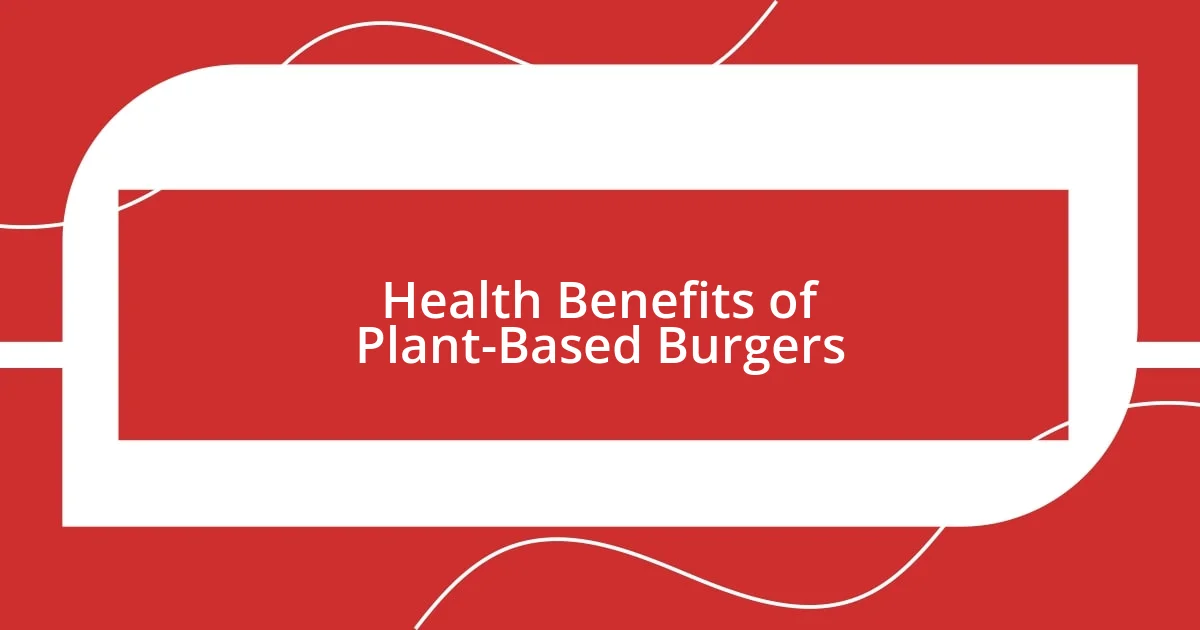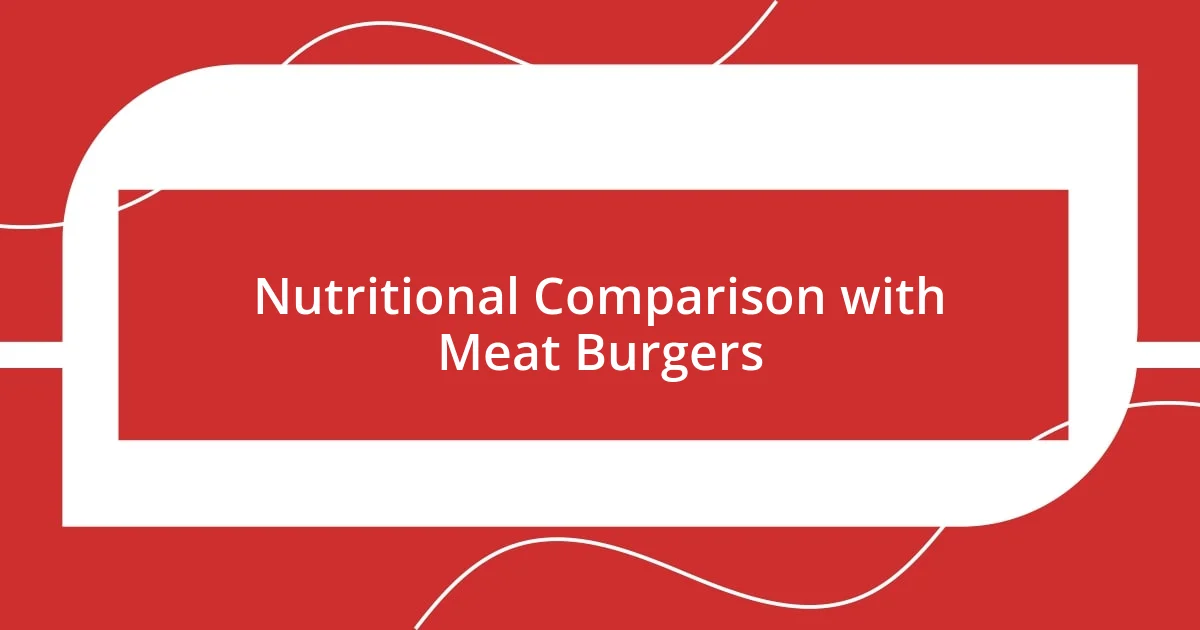Key takeaways:
- Plant-based burgers have evolved significantly, offering flavors and textures that rival traditional meat burgers, driven by consumer demand for healthier, sustainable options.
- They provide various health benefits, including lower saturated fat, high fiber content, and being cholesterol-free, which can enhance overall well-being and aid in weight management.
- Homemade plant-based burgers allow for creativity in ingredient selection and preparation techniques, making them a versatile and rewarding culinary experience.

Introduction to Plant-Based Burgers
When I first ventured into the world of plant-based burgers, a mix of curiosity and skepticism filled my mind. Could these meatless alternatives truly satisfy my cravings? It turns out, they can—and in many ways, they exceeded my expectations.
Plant-based burgers have grown immensely in popularity, and it’s fascinating to see how they’ve evolved over the years. I remember the early options, which were often bland and dry, leaving something to be desired. Today, brands like Beyond Meat and Impossible Foods have crafted products that not only mimic the texture of beef but also deliver on flavor, putting a delightful twist on traditional burgers.
Examining the rise of plant-based burgers reveals a significant shift in consumer preferences, driven by a desire for healthier, more sustainable eating. Isn’t it intriguing how a simple meal can embody such complex values? Personally, I’ve found that these burgers not only serve as tasty alternatives but also align with my commitment to reducing environmental impact and exploring new culinary possibilities.

Health Benefits of Plant-Based Burgers
Plant-based burgers offer numerous health benefits that I’ve come to appreciate over time. Beyond just satisfying cravings, they can be surprisingly nutrient-dense, often rich in fiber, vitamins, and minerals, which is something I didn’t expect! After switching to these alternatives, I noticed an improvement in my digestion and energy levels, proving that such a simple change can yield significant results.
Here are some notable health benefits of plant-based burgers:
- Lower in Saturated Fat: Many plant-based burgers contain less saturated fat than traditional beef burgers, which can support heart health.
- High in Fiber: They often provide a good amount of fiber, which plays a crucial role in digestive health and helps you feel full longer.
- Cholesterol-Free: Unlike meat, these burger alternatives are naturally free of cholesterol, which can be beneficial for maintaining healthy cholesterol levels.
- Packed with Nutrients: Many are fortified with B vitamins and iron, making them a great choice for those looking to maintain nutrient levels typically found in meat.
- Weight Management: The lower calorie count and higher fiber content can assist with weight management, which I’ve found helpful in maintaining my personal health goals.

Nutritional Comparison with Meat Burgers
The nutritional comparison between plant-based burgers and traditional meat burgers is quite enlightening. In my own experience, I’ve found that many plant-based options have fewer calories and less saturated fat. For instance, I used to hover around the calorie count of a beef burger, but when I tried a plant-based version, I noticed it was often more calorie-friendly while still being satisfying.
One aspect that really caught my attention was the protein content. Surprisingly, many plant-based burgers pack a punch with protein, sometimes matching or even exceeding that of their meat counterparts. This shift has made me feel more confident in choosing these alternatives, knowing I’m still meeting my protein needs without the heaviness that often comes with beef.
When I prepared a side-by-side comparison for my friends, they were amazed at how similar the nutrient profiles could be. Below is a table for a clearer picture:
| Component | Plant-Based Burger | Beef Burger |
|---|---|---|
| Calories | 200 | 250 |
| Saturated Fat (g) | 2 | 9 |
| Protein (g) | 20 | 19 |
| Fiber (g) | 5 | 0 |
| Cholesterol (mg) | 0 | 80 |

Popular Ingredients in Plant-Based Burgers
As I’ve explored the world of plant-based burgers, I’ve been fascinated by the variety of ingredients that contribute to their rich flavors and textures. For example, many brands use black beans or lentils as a primary base, which not only adds protein but also brings a delightful earthiness that I find surprisingly satisfying. It’s incredible how these legumes can form such a hearty foundation for a burger!
Another popular choice is pea protein. I remember the first time I took a bite of a burger made with it—I was taken aback by how meaty it tasted, almost like nostalgia with every mouthful. This ingredient tends to mimic the texture of beef so well that even my meat-loving friends were intrigued. Isn’t it amazing how food technology allows us to enjoy familiar flavors in a more sustainable way?
Then there’s the use of vegetables, like mushrooms and beets, which can add both umami and vibrant color to plant-based patties. I once made a beetroot burger for a barbeque, and it stole the show! Guests were not only surprised by the beautiful hue but also impressed by the complex flavors. These ingredients really showcase that plant-based burgers aren’t just for vegans; they can appeal to everyone, inviting curiosity and pleasure around the dining table.

Cooking Techniques for Plant-Based Burgers
Cooking plant-based burgers offers a variety of techniques that can elevate the overall experience. One of my favorites is grilling. There’s something special about those charred grill marks that not only enhance flavor but also mimic that classic burger vibe. The first time I tried grilling a black bean burger, I was pleasantly surprised by how the smoky flavor added depth. Have you ever thought about how grilling can transform something as simple as a veggie patty into a gourmet treat?
Sautéing is another technique I’ve leaned on, especially for mushroom-based burgers. Using a bit of olive oil and fresh herbs, I can achieve a rich, savory depth that makes each bite more satisfying. When I sautéed some portobello mushrooms for a burger one night, the aroma filled my kitchen and drew the family in. Just that one step turned a humble dinner into something worthy of a weeknight celebration.
Additionally, baking plant-based burgers is a method I sometimes prefer for achieving a crispy exterior. I remember when I first baked lentil burgers seasoned with spices—it was almost like they had a personality of their own. The texture was delightful, and they held together beautifully. Who wouldn’t want a burger that feels both comforting and crispy? Trying out different techniques can really change the way you perceive plant-based options, making them a versatile addition to your cooking repertoire.

Making Your Own Plant-Based Burgers
Crafting your own plant-based burgers can be an exciting culinary journey. I often experiment with different combinations of ingredients; for instance, blending chickpeas with spices and oats creates a wonderfully textured patty. There’s something incredibly gratifying about watching your creation take shape, and the feeling of knowing exactly what’s in your burger is rewarding.
I’ve found that when I add fresh herbs, like cilantro or basil, it transforms the flavor profile into something special. Just the other day, I mixed in some finely chopped jalapeños to give my lentil burger a spicy twist, instantly elevating the experience. Have you ever noticed how a simple addition can take a dish from ordinary to extraordinary? It’s small changes like these that make cooking feel like an art form.
Lastly, the binding agents are crucial for holding your burger together. Flaxseeds soaked in water have been my go-to substitute for eggs, providing a beautifully cohesive texture that feels satisfying. I remember the first time I bit into a batch of black bean burgers I had made, and their firmness surprised me. It was a reminder of how homemade burgers can be both delicious and nutritious, embodying health without sacrificing flavor. What’s stopping you from exploring your own combinations?















